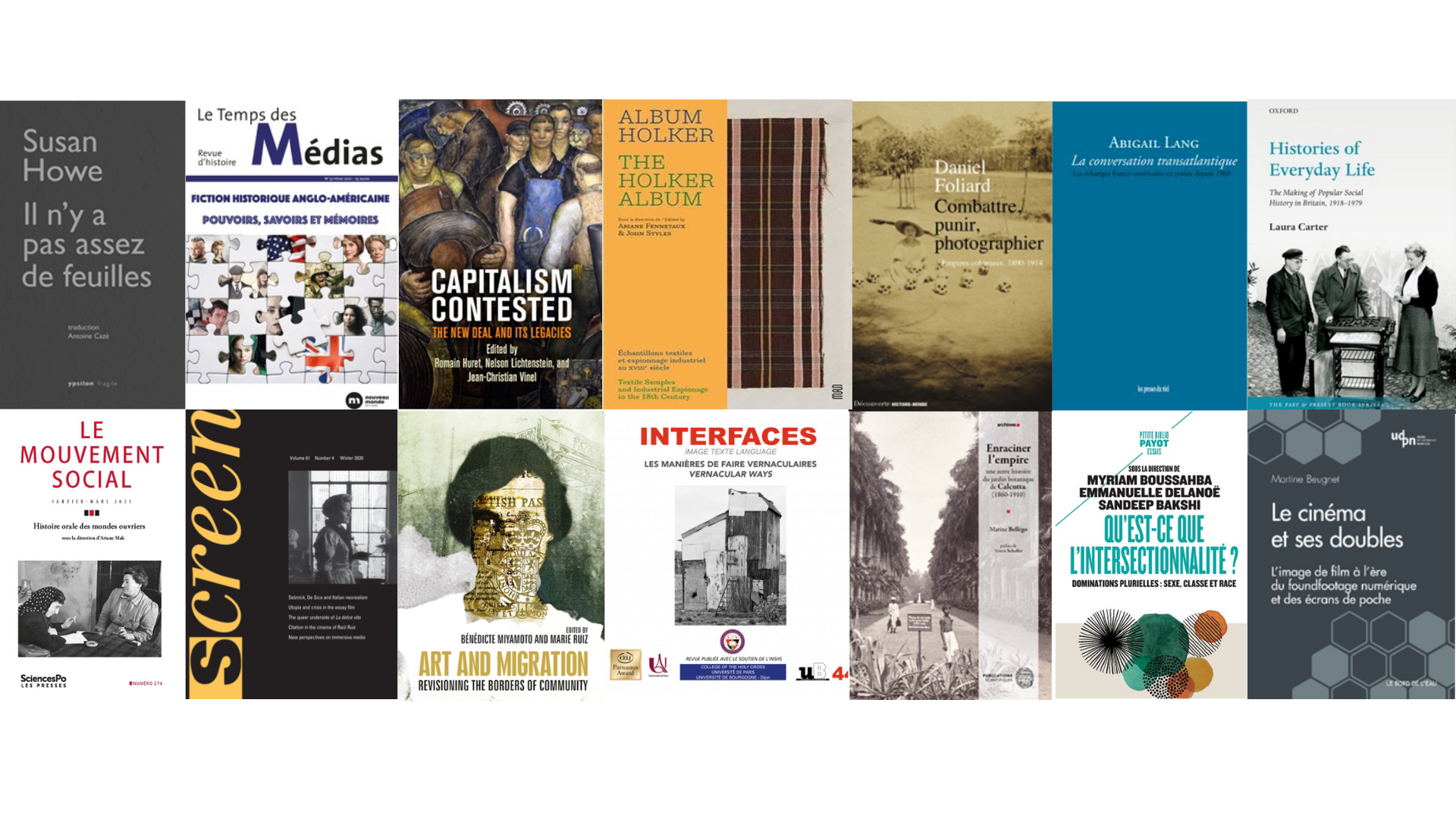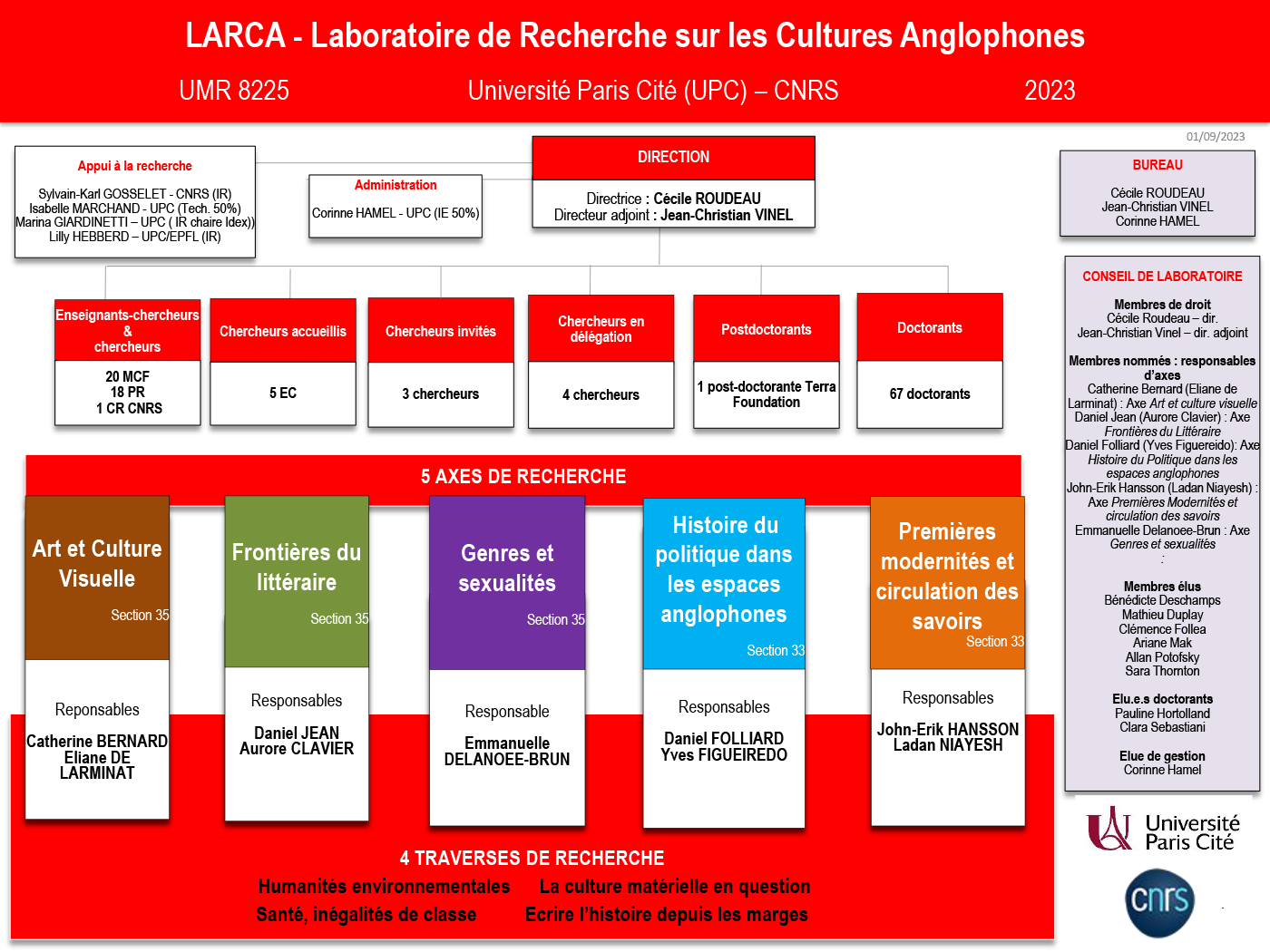
Presentation
LARCA is an interdisciplinary research unit of Université Paris Cité and the CNRS whose members study the histories, literatures, arts and cultures of English-speaking countries and their links to the wider world. Drawing together literary scholars, political, social, and cultural historians, art historians, and specialists of photography, film, television, and emerging media, LARCA is a research laboratory that bridges the disciplines and mediates between academic cultures in France and the English-speaking world.
Associated to the Anglophone Studies Department at the Université Paris Cité, an interdisciplinary unit, LARCA advocates and practices this interdisciplinarity:
- by making links between the traditional “literature” and “history” teaching categories
- by taking a historical approach on anglophone cultures but also by considering objects and questions – among which historical questions – through the prism of a precise, textual or formal perspective anchored in the English language
- by focusing on cross-disciplinary objects such as visual and material cultures, early modernity studies, or contemporary imaginaries
Organization Chart

Larca Members
LARCA counts among its members:
- about fifty faculty members
- about ten hosted reseachers
- five visiting research fellows
- about sixty PhD students
It is one of the largest anglophone studies research units in France.
Axes and Cross Axes
Since 2017, LARCA has broadened its scope by developing five axes and six cross-axes for 2019-2023.
Axes
- Art and Visual Culture
- Boundaries of Literature
- Gender and Sexuality Studies
- History
- Early Modernities and the Circulation of Knowledge
Cross-axes
- Environmental Humanities
- Working Classes
- Material Culture in Question
- Writing History from the Margins
Larca Team
Board
- Cécile Roudeau – Director
- Jean-Christian Vinel – Deputy director
Administration
- Corinne Hamel – Administration manager
Research Ingeneers and Technicians
- Karl Gosselet – Research Engineer PhD in history – CNRS
- Isabelle Marchand – Online communication manager
LARCA Council
The LARCA council has a consultative role. Its president is the unit director, Cécile Roudeau, assisted by Jean-Christian Vinel.
The board meets at least three times a year and when needed, depending on the activity.
- Ex officio members
- Cécile Roudeau – director
- Jean-Christian Vinel – assistant director
- Appointed members
- Catherine Bernard – (Éliane de Larminat) – directors of the Art and Visual Culture axis
- Daniel Jean (Aurore Clavier) – director of the Boundaries of Literature axis
- Daniel Foliard (Yves Figueiredo) – director of the History axis
- John-Erik Hansson – (Ladan Niayesh) – directors of the Early Modernities and the Circulation of Knowledge axis
- Emmanuelle Delanoe-Brun – director of the Gender and Sexuality axis
- Elected members
- Doctoral elected representatives
- Elected for the board of management
- Corinne Hamel, administrative and management director
- Permanent guests
- Sylvain-karl Gosselet, CNRS
- Isabelle Marchand, webmaster
Revues
LARCA produces one scientific journal : Arts of War and Peace
LARCA supports and is involved in the publication of two scientific journals:
- Interfaces, edited by the College of the Holy Cross (Worcester, Mass., USA), Université Paris Cité (France), and Université de Bourgogne-Franche-Comté (UBFC, France).
Interfaces is a bilingual illustrated journal focusing on the dividing line – the “interface” – between language and the image, two means of expression different and yet inseparable. This interface was displaced when the cinema made the image move, then speak, thus making time its medium and creating a new type of discourse. Meanwhile the old interface between language and the static image still remains and its power is enhanced by modern technology. - Launched in 2012, TV/Series is the first journal to publish articles, in English and in French, addressing audiovisual serial fiction from all over the world. Series are analyzed as narrative, aesthetic and ideological artworks existing on an ever-increasing number of platforms.

